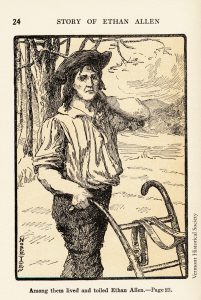by Kyle Callahan
As a newly-christened member of the Historical Society, I’m reading the 1875 version of the history of our town. The authors — Joseph Joslin, Barnes Frisbie, and Frederick Ruggles — were appointed by the annual town meeting to collect materials for a history of Poultney, beginning with the settlement of its original British subjects. Having received no further instructions by 1875, they published it themselves.
My favorite part of the history (so far) comes when the authors take a moment to apologize for what they see as a defect in some of the town’s founders, namely, the Allens (as in Colonel Ethan Allen and his relatives) and the Ashleys, both of whom’s “influence predominated in Poultney for some years subsequent to the first settlement of the town.”
After remarking on the Allens’ and Ashleys’ better qualities — “integrity, honesty, fair dealing, unflinching patriotism, and devotion to the interests of the new settlements — the authors of the 1875 history “regret to publish” that the Allens’ and Ashleys’ “prevailing influence in the western part of the town, for nearly half a century after the first settlement, was infidel in its character.”
They strive to make clear that “this sentiment of infidelity…was finally eradicated, and that for the last half-century we have been as free from it as our neighboring towns.”

Courtesy of Vermont History Explorer
Besides noting its opposition to Christianity, the authors do not interrogate the nature of western Poultney’s infidelity. Still, we can guess its character by perusing Ethan Allen’s 1784 book, Reason, the Only Oracle of Man: Or, A Compendious System of Natural Religion.
Allen began the book in the 1760s, writing with his philosophical mentor, Dr. Thomas Young. Dr. Young was not only an organizer of the Boston Tea Party and the founder of the revolutionary Boston Committee of Correspondence, he is also credited with giving Vermont its name. However, Allen didn’t finish the book until after Dr. Young’s death.
In the Preface to Reason, the Only Oracle of Man, Allen writes, “I have generally been denominated a Deist [but] as to being a Deist, I know not, strictly speaking, whether I am one or not, for I have never read their writings.”
Nevertheless, it is clear from his argument that the label surely fits. Colonel Allen dedicates the first section of his book to his proof that God exists: the universe requires (to his mind) an independent and infinitely self-existent cause, and this is rightfully called God. “The knowledge of nature,” he writes, “is the revelation of God.”
He cautions, “so certain that God is, we cannot comprehend his essence, eternity, or manner of existence.” Meanwhile, the existence of order, the scientific laws discovered by human reason, proves “our obligation to love and adore God because he provides for us and is beneficent to us.”
But as the 1875 authors knew, Allen’s God was not the same as the God of Christianity. Allen’s argument deconstructs the trinitarian God by asking were “it possible that three absolute infinites, which is the same as three Gods, could be contained in one and the self-same essence, why not as well have any number of infinites?”
He answers his rhetorical question: “real infinity is strict and absolute infinity, and only that[. It] cannot be compounded of infinities or of parts, but forecloses all addition.” For Allen, the notion of a triune God produces “a limited omnipresence, a weak Almighty, or a finite God.”
Colonel Allen then takes on Jesus Christ. He argues that even Jesus understood his lack of divinity. Speaking of the apocalypse, Jesus admitted that “of that day and that hour knoweth no man, no, not the angels which are in heaven, neither the Son, but the Father “(Mark 13:32). Allen writes, “This is giving up all pretension to divinity, acknowledging in the most explicit manner, that he did not know all things…Thus [Jesus] ranks himself with finite beings.”
Further, by saying later, “not my will, but thine, be done” (Luke 22:42), Jesus offers “the most humble submission to his father’s will, authority, and government…[which is] utterly inconsistent and unworthy of a God.”
Allen follows his denial of the Holy Trinity and Jesus Christ’s divinity with a sustained denunciation of Moses’ account of history and a rejection of the Old and New Testament as the products of “divine inspiration.”
With such criticisms, we can understand why the Christian authors of the 1875 history would call Allen’s influential belief system an “infidelity.”
But nearly 150 years after the authors claimed the infidelity against Christianity was “eradicated” from the western part of the community, I’m happy to report that atheists such as myself continue to call western Poultney home. We pay our taxes, send our children to the public schools, and break bread, without incident, with believers of all stripes.
Eradication? I believe not.

Comments are closed.